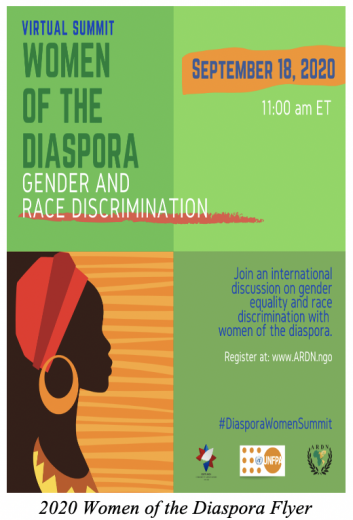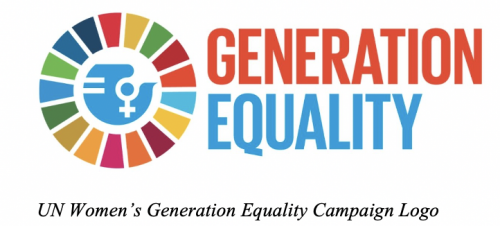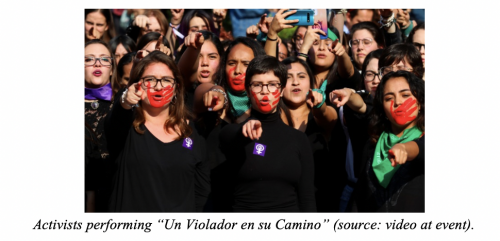Women of the Diaspora Summit: Improving Gender and Racial Quality
by Paula Ryszkiewicz
Published September 2020
Women of the Diaspora Summit: Improving Gender and Racial Quality

High level officials from around the world gathered on Zoom for the “2020 Women of the Diaspora Summit” held on Friday, 18 September 2020. This virtual event was hosted by the African Renaissance and Diaspora Network (ARDN). Established in the 1990s and headquartered in New York City, ARDN is an NGO that works to support unity between the countries of Africa and all people of African descent worldwide.
The “2020 Women of the Diaspora Summit” was an international discussion on gender equality and race discrimination with women of the Diaspora. Major topics covered included intersectional feminism, gender and racial equality, education, employment, health, and fair wages.
Speakers also discussed how improving gender and racial equality will further the United Nations Sustainable Development Goals (SDGs), specifically Goal 5: gender equality, Goal 10: reduced inequalities, and Goal 16: peace, justice and strong institutions. While already interlinking those 3 goals, the work of ARDN and the topics of the Summit touch on all the SDGs, given that the ARDN reaches peoples from every continent, and given that their focus on race and gender are cross-cutting issues that influence nearly every aspect of an individual’s life. With this broad reach, the nine speakers also focused on concerns related to Goal 4: quality education, and Goal 3: good health and well-being.
The program included very diverse elements. It began with an inspiring video, showing clips of marches, protests, and human rights campaigns led by women. The voiceover described the passion of the women's rights movement, and how gender equality remains a global priority, announcing that, “We have come a long way, but the fight is not over.” Clips of inspiring women’s rights activists of the past remind viewers of the successes that have been celebrated, and the clips of  present activists bring attention to battles yet to be won. Phrases calling for action on issues set the tone for the Summit. These include: “Leave no one behind,” which is a common theme throughout all issues presented at the United Nations, and “We are all united for gender equality, and the future we create for women and girls is up to all of us.”
present activists bring attention to battles yet to be won. Phrases calling for action on issues set the tone for the Summit. These include: “Leave no one behind,” which is a common theme throughout all issues presented at the United Nations, and “We are all united for gender equality, and the future we create for women and girls is up to all of us.”
The video clips became a collage, forming the logo of “Generation Equality,” which is the theme of International Women’s Day 2020, marking the 25th anniversary of the Beijing Declaration and Platform for Action, promoted by the UN agency, UN Woman. The logo consists of a circle representing the 17 SDGs surrounding the shape of a peace dove and a symbol of a female. I think this logo is a perfect symbol for this cause, as it shows that the SDGs protect and promote programs for equality and peace.
The co-moderators of the event, ARDN Chair Constance Newman, and ARDN youth representative Dakota Gant, opened the meeting by introducing the discussion topics surrounding gender and race discrimination, and noted that while many speakers will point out problems, they were most excited for discussions about solutions to end gender and racial discrimination.
Even though the COVID-19 pandemic required the meeting to be held remotely, the Zoom format brought an intimate, conversational atmosphere to the Summit. Constance Newman, for example, was seated on a couch decorated with traditional African fabrics, conversing comfortably and amicably. This was especially effective for a discussion on issues that touch people in such a profound and personal way.
Costa Rican politician and economist H.E. Epsy Campbell-Barr, the First Vice President of the Republic of Costa Rica was the first speaker. Of note, the 57-year old Ambassador is the first woman of African descent to become vice president of Costa Rica, and the second female vice president of African descent in the Americas. Ambassador Campbell-Barr emphasized the importance of human rights programs, and global action for the eradication of racial and gender-based discrimination, making gender and racial equality a priority, and working with a women’s rights agenda.
Speaking with pride on behalf of the advances of her country, Ambassador Campbell-Barr announced Costa Rica’s international campaign against racism and named the 31st of August as Costa Rica’s International Day of People of African Descent. The date was selected to commemorate the First International Convention of the Negro Peoples of the World, which was held in Madison Square Garden on August 31, 1920, and culminated in the publication of the Declaration of the Rights of the Negro Peoples of the World. On Costa Rica’s International Day of African Descent, African culture is celebrated with activities around the country, centered around Limón, a city in Costa Rica, where the largest population of African descendants reside. The celebrations are spearheaded by the Civic and Cultural Committee of the Black Peoples of Limón, who have made it their mission to preserve the cultural traditions of African descendants in Costa Rica. The celebrations include a parade which showcases the region’s music, dance, artwork, and cuisine (Sicultura, 2020). I imagine this parade not only brings fun to the families, but inspires pride in African heritage, and will be a tradition that will continue for generations.
ARDN President and CEO Dr. Djibril Diallo spoke about the importance of designing effective solutions, and urgency, to end violence against women. In this regard, he pointed to the importance of the Red Card campaign, launched at a session at the United Nations during the Commission on the Status of Women, on 2 March 2020 (ARDN, 2020; Starkweather & Kuriansky, 2020). The campaign goals are to empower women, increase visibility of the challenges faced by women, and address the importance of including men in the fight for gender equality. The campaign also works to bring attention to the SDGs, particularly SDG 5: Gender Equality, and highlight programs that promote a more equitable world.
The Red Card, held up in soccer games as a violation, is a perfect metaphor for the violation of women’s rights by any abuse. Pledges can be made at: www.redcardpledge.com. Diallo vowed his support to the work of the women leaders, expressing pride to work alongside them. He also spoke out against racism, saying, “Nobody is free until everyone is free. Justice is never given. It is always won.” His speech was a call to global action, not just to denounce racism, but to be actively anti-racist. According to the UN Global Compact, anti-racist actions include being vocal in advocating for equality, educating yourself and others through anti-racist resources, and committing to closing the opportunity gap by investing in Black people and other marginalized people of color (UN Global Compact, 2020).
The Summit’s special guest was H.E. the Rt. Honorable Michaelle Jean, former Governor and Commander in chief of Canada and former Secretary General of the International Organization of la Francophonie. She spoke passionately about her own experiences as an immigrant from Haiti who moved to Canada, and addressed the topic of intersectional feminism, a term coined in 1989 by Kimberlé Crenshaw, an American law professor. Crenshaw defines intersectional feminism as “a prism for seeing the way in which various forms of inequality often operate together and exacerbate each other” (UN Women, 2020). Intersectional feminism recognizes that systems of oppression occur concurrently and proposes a unified fight for a better future. Rather than dividing efforts to combat different forms of oppression separately, intersectional feminism empowers people to take on the challenges of other groups. “If you see inequality as a “them” problem or “unfortunate other” problem, that is a problem,” Crenshaw says (UN Women, 2020).
H.E. Jean also spoke passionately about the generations of injustice that people of African descent have been forced to endure. Slavery and loss of home and freedom affected all people of the African Diaspora, she pointed out, adding that residual racist ideologies continue to inflict pain on individuals and communities. Warning the Summit attendees against the desire to sugar-coat the past, she emphasized that the pain must be recognized in order to heal. Especially when educating younger generations, she said, it is essential to convey the difficult facts of history.
 It is well recognized that song and dance are international languages, which can convey more emotion and spirit than the spoken word. Thus, the speakers paused to view a performance piece entitled “Un Vilador en tu Camino,” created by Las Tesis, a Chilean feminist group, known for incorporating feminist theory into their creative outreach work. The performance, originally presented on the International Day Against Violence Against Women worldwide in 2019, included a song with Spanish lyrics and a choreographed dance. The title translates to: “A Rapist in Your Path.” The song lyrics were an adaptation of the poetry of feminist anthropologist Rita Segado (Women’s March, 2020).
It is well recognized that song and dance are international languages, which can convey more emotion and spirit than the spoken word. Thus, the speakers paused to view a performance piece entitled “Un Vilador en tu Camino,” created by Las Tesis, a Chilean feminist group, known for incorporating feminist theory into their creative outreach work. The performance, originally presented on the International Day Against Violence Against Women worldwide in 2019, included a song with Spanish lyrics and a choreographed dance. The title translates to: “A Rapist in Your Path.” The song lyrics were an adaptation of the poetry of feminist anthropologist Rita Segado (Women’s March, 2020).
During the summit, the attendees viewed clips of the 2019 performance, which included scenes of activists performing in world cities including Santiago, London, Berlin, Paris, and New York. I found this performance very inspiring, as it demonstrated that when women around the world are unified, their collective voice is strong and powerful.
The next speaker, Dr. Natalia Kanem, Under-Secretary General (USG) and Executive Director of the United Nations Population Fund (UNPFA) introduced Session 1 of the Summit: Discrimination Against Women on the Basis of Gender and Race. Dr. Kanem began with a rhetorical question for the audience to ponder throughout the session: “Why does discrimination exist, and what can we do?” Her tone was intentionally incredulous, as if to imply that it is hard to believe that this question even needed to be asked. Yet, I felt from her tone, and in fact from the energy from the entire summit, that this is a question that the Summit panelists who all are, global leaders in equality, are prepared to answer.
Dr. Kanem’s overall message reminds us: All people are born free with dignity, and it is a human right to restore that freedom.
The next speaker, Hon. Diane Abbot, British Member of Parliament from the Labour Party in the United Kingdom, spoke about education, focusing on the need to create opportunities for youth. Her resounding message to youth was that power concedes nothing; do not be afraid to go out and get what you want. She also said that a key ingredient of the goal to achieve education parity for young women of African descent is international support, requiring that all countries work to attain the same level for women worldwide.
Racism and sexism are “twin scourges” on our shared history, was the powerful remark by the next speaker, Jonetta Cole, President and National Chair of the National Council of Negro Women. This point was particularly impassioned and impressive in my estimation. Insisting that racism must be faced and discussed if it is to be reconciled. Cole punctuated the end of her speech with a quotation of an African proverb: “When women lead, streams run uphill” alluding to the monumental power that a unified effort of women leaders can produce.
The next speaker, Dr. Sonia Sachs, Director of Health at the Center for Sustainable Development at Columbia University, spoke about the discrimination women face in the field of healthcare. She made an emphatic point that due to women’s unique biological role in human procreation, and the hazards that accompany childbirth, safe and accessible care is an issue of life or death. In discussing healthcare discrimination, Dr. Sachs divided issues into “active” or “passive” discrimination that threaten the health of women. Active forms of discrimination include neglect, infanticide, female genital mutilation, child marriage, and requirements that a woman cannot enter a hospital without her husband. All of these are unacceptable. Passive forms of discrimination are more insidious, such as systems that do not consider the needs of women, thus adding daily obstacles for women to get basic needs met. Dr. Sachs also argued that underfinanced community health services in developing regions are a form of gender discrimination. While all people are impacted by the lack of community health services, women are disproportionately affected. For example, complications during childbirth in areas without adequate health services cause 300,000 female deaths per year. This cannot continue, she said, and instead, it is incumbent on the international community to insist on basic healthcare for all. This point stresses the urgent importance of the international agreement for Universal Health Coverage.
The Africa Union Youth Envoy, Ms. Aya Chebbi, from Tunisia, spoke about what she called “mothers” and “daughters,” meaning feminists of the older and younger generation respectively. Addressing mothers, she asked, “What world would you like to leave for us?”
The current world, Ms. Chebbi described, is filled with challenges for women. These include widespread violence, reminding us that feminism has a long way to go. Chebbi appealed to mothers that the younger generation needs their help to start needed change that their daughters will inherit.
Ms. Chebbi also describes the link between the feminist movement and pan-African women, which are intertwined through their shared history in colonialism and patriarchy. All injustice is connected in systems of oppression, she said, and only a unified approach of fighting against injustices based on gender, racial, and climate can dismantle it.
Ms. Chebbi also called on the “mothers” within the summit to support her intergenerational feminist movement, co-leading and working together. This point inspired a discussion amongst the panelists, agreeing that combining the wisdom of elders with the energy of the younger generation has great promise. Dr. Natalia Kanem further connected Ms. Chebbi’s speech to discrimination facing the LGBTQ community, as all are a result of patriarchy.
This discussion provided an excellent conclusion to Session 1, with all panelists contributing ideas and responding to their fellow speakers. In my view, it reflected a true demonstration of intergenerational feminism.
The Summit then transitioned into Session 2: Discrimination Solutions - Case Studies. This section opened with a video by an anonymous South African activist, discussing the Red Card campaign, and delivering a grassroots message to end violence against women. In the video, the female activist is shown using her smartphone to demonstrate how quick and easy it is to sign up for the Red Card Campaign. I appreciated this video because it engages a young generation of feminists and shows how modern technologies are leveraged for the feminist movement.
The first speaker in this session, Ms. Tonni Brodber, Representative ai at UN Women, the intergovernmental agency that addresses all issues related to women, highlighted what she referred to as insidious, unseen issues of gender and racial inequality. This includes messages of anti-Blackness, perpetuated by media messaging as well as cultural stigmas. However, she pointed out, these negative messages have been reduced by increased representation of Black women in politics, business and the arts, whom Ms. Brodber praised for contributing to overall progress for women of the Diaspora.
Referring to the Summit title, Ms. Brodber highlighted the traditions of the women of the diaspora, and inspiring ways that their legacies have survived, despite challenges of patriarchy, colonialism and slavery. As an example, she described the tradition of oral storytelling, which was one of the few ways Black women could preserve their history during the cruel and uncertain times of slavery. Despite all odds, these stories were preserved, and the art form of storytelling endures as a part of Pan-African culture. Ms. Brodber concluded her speech with a warning against internalized discrimination, which she pointed out can be self-generated. The solution to avoid such self-generation of discrimination is to achieve love for yourself and your heritage, that then can further lead to love for others. In my view as a graduate student in psychology, this point resonates with studies in counseling and clinical psychology, as well as with research in developmental psychology and socialization. From this perspective, Ms. Brodber’s speech offers solutions to the psychological and emotional elements of discrimination, maintaining that true solutions are not merely discussed, but are internalized and resonate emotionally.
Making remarks again in this session, Ambassador Campbell-Barr pointed out specific solutions she is working on to end discrimination, such as governmental action. Pledging Costa Rica’s dedication to dignify life, and to condemn racism, she extended solidarity to the members of the Black Lives Matter Movement, and the family of George Floyd, a Black man killed by police officers on May 25, 2020, in Minneapolis, Minnesota, whose death ignited vast public reaction against “systemic racial discrimination.” Ambassador Campbell-Barr cited her country’s historical tribunal against racism, signed by the President of the Republic, the President of Congress, the President of the Supreme Court of Justice, and the Supreme Electorate Tribunal. She also cited her office’s work with UNFPA and the World Bank, and she noted the additional work with the High Commissioner for Human Rights which supports the global movement of Black Lives Matter.
Ms. Clementina Acedo, Director of the Webster University campus in Geneva, spoke about inequalities in education faced by women and girls in the Diaspora. Education is a priority, not just a human right, and enables growth and sustainable development, while facing many barriers, such as poverty, discrimination, social norms, and stereotypes. She applauded Ms. Chebbi’s statements about intergenerational feminism, stating that this is a potent tool to assist young women to succeed academically.
The next speaker, Ms. Sara Branco, a lawyer and consultant at the Center for Studies on Labor Relations and Inequalities (CEERT), and Member of the Black Coalition for Rights in Brazil, spoke about how the combined discrimination of race and gender place Black women at increased vulnerability. She cited the shocking statistic that 56% of victims of gender-based violence are women of African descent. She elaborated that women of the Diaspora are being left behind because of many factors including the wage gap, limited representation in politics, and lack of resources allocated to Black women and girls. COVID-19 has exacerbated these issues. Thus, she proclaimed, now is the time to be extra vigilant to make sure Black women’s voices are heard.
The next speaker, as a representative of youth, Ms. Nonhlanhla Jiyane, Director for South Africa and Representative to the Southern African Development Community of ARDN, spoke about the need to provide resources for young women to achieve financial independence, education, and personal growth, and connected these goals to the Sustainable Development Goals of the UN 2030 Agenda. She cited programs such as Women’s Equality Day, Equal Pay Day, and the Red Card campaign, all of which support the goals of gender equality. She implored that these projects all require global support in order to be successful. She praised the Red Card campaign, as the most promising solution to ending gender-based violence, and implored viewers to sign the pledge at the Red Card campaign website: www.redcardpledge.com. Ms. Jiyane reminded everyone that men must also be included in feminist campaigns.
Questions from the audience, entered on the internet site, were entertained. The first question requested advice to break the glass ceiling. Ms. Brodber answered that women must unite, citing that UN Women has created the Women's Empowerment Compact as a pledge to support women's rights, but the next step is to outline specific actions that businesses can take to support female employees. The compact can be viewed and signed here: https://www.unglobalcompact.org/take-action/action/womens-principles (United, 2020). She added concerns that even in situations where women are highly educated, there are still barriers to employment. These barriers must be addressed to achieve gender parity (UN Global Compact, 2020).
Session 2 concluded with a video of the dedication of the newly renamed Black Lives Matter Plaza, in Washington, DC, on June 5, 2020. The renaming of the plaza took place during the height of the Black Lives Matter protests after the killing of George Floyd by a Minneapolis police officer. This dedication of the plaza was not just a response to the protests, but an amplification of the protesters’ voices, with the words “Black Lives Matter” stenciled in huge yellow letters on the asphalt pavement.
Viewing this video at the end of the Summit gave me a new perspective as I reflected on the words from the panelists. I thought about how we could amplify the messages of the Summit to promote equality for all. This report is one way that I can help to amplify the important discussions of the Summit and share this important work with the psychology student community.
In closing remarks, UNFPA’s Dr. Kanem summarized the speakers’ messages that “The fight is in our backyard.” In saying this, Dr. Kanem reminded leaders that even international issues have implications at the local level. While she acknowledged the importance of policy and high-level projects, she implored the summit members to give attention to grassroots actions, which will engage women worldwide.
Ambassador Campbell-Barr also offered closing remarks, pledging Costa Rica’s continued support for women of the Diaspora.
I chose to report on this Summit because I am passionate about feminist issues, and I believe that feminism must be intersectional to be successful. When I think of intersectional feminism, I am reminded of the words of Martin Luther King Jr: “Injustice anywhere is a threat to justice everywhere.” The wound of injustice does not know any boundary, and it is our responsibility to be vigilant against injustice in its many forms. This is especially true in the field of psychology. It is important for psychologists to be familiar with the challenges of racial injustice and gender inequalities to best serve the population, and to create programs that will advance global health and well-being. I was very inspired by this summit and the passionate leaders who are making gender and racial equality a global priority.
References
ARDN: African renaissance and diaspora network. (2020). Press release global launch of ARDN red card campaign. Press releases. https://www.ardn.ngo/press-release-global-launch-of-ardn-red-card-campaign-6-march-2020/
Red card pledge. (2020). www.redcardpledge.com
Sicultura: Sistema de información cultural Costa Rica. (2020). Day of the black person and Afro-Costa Rican culture. https://si.cultura.cr/expresiones-y-manifestaciones/dia-de-la-persona-negra-y-la-cultura-afrocostarricense.html
Starkweather, S, & Kuriansky, J. (2020). The Red Card Campaign: Global Launch Against All Forms of Violence and Discrimination Against Women and Girls. International Association of Applied Psychology: IAAP at the UN. https://iaapsy.org/iaap-and-the-united-nations/reports-meetings-events/the-red-card-campaign-global-launch-against-all-forms-of-violence-and-discrimination-against-women-and-girls/
United nations entity for gender equality and the empowerment of women. (2019). Generation equality: realizing women’s rights for an equal future. UN Women. https://www.unwomen.org/en/digital-library/publications/2019/05/generation-equality
United nations entity for gender equality and the empowerment of women. (2020, July 1). Intersectional feminism: what it means and why it matters right now. UN Women. https://www.unwomen.org/en/news/stories/2020/6/explainer-intersectional-feminism-what-it-means-and-why-it-matters?utm_source=dlvr.it&utm_medium=facebook
United nations global compact. (2020). Anti-racist action for business. https://www.unglobalcompact.org/what-is-gc/our-work/social/racism
United nations global compact. (2020). Endorse the women’s empowerment principles. https://www.unglobalcompact.org/take-action/action/womens-principles
Women’s march. (2020). Lyrics and dance: un violador en tu camino. Women’s march. https://womensmarch.com/2020-dance
EVENT OVERVIEW
Title: 2020 Women of the Diaspora Summit
Date/Time: Friday, 18 September 2020, 11:00 - 13:00
Location: Virtual summit powered by Zoom
Moderator: Hon. Constance B. Newman, Chair of the Board, African Renaissance and Diaspora Network; Ms. Dakota Gant, ARDN Youth Representative.
Summit Co-Hosts: Dr. Djibril Diallo, President and CEO, African Renaissance and Diaspora Network; Dr. Natalia Kanem, Under-Secretary General (USG), Executive Director of the United Nations Population Fund (UNPFA); H.E. Ms. Epsy Campbell-Barr, First Vice President of the Republic of Costa Rica.
Panelists: H.E. the Rt. Honorable Michaelle Jean, former Governor and Commander in chief of Canada, former Secretary General of the International Organization of la Francophonie; Hon. Diane Abbott, British Member of Parliament, Labour Party, United Kingdom; Dr. Johnetta Cole, President and National Chair, National Council of Negro Women; Dr. Sonia Sachs, Director of Health, Center for Sustainable Development at Columbia University, Director One Million CHW Campaign; Ms. Aya Chebbi, Africa Union Youth Envoy; Ms. Tonni Brodber, Representative at UN Women; H.E. Ms. Epsy Campbell-Barr, First Vice President of the Republic of Costa Rica; Ms. Clementina Acedo, Director of Webster University, Geneva; Ms. Sara Branco, Lawyer, Consultant at CEERT, and Member of the Black Coalition for Rights, Brazil; Ms. Nonhlanhla Jiyane, Director for South Africa and Representative to the Southern African Development Community, ARDN.
Reported by Paula Ryszkiewicz, pursuing a Master’s degree in Clinical Psychology in the Department of Clinical Psychology at Columbia University, Teachers College, a student in Professor Judy Kuriansky’s class on “Psychology and the United Nations,” and a member of the Student Division of the Internaational Assoication of Applied Psychology.
Cite this article as: Ryszkiewicz. P. (2020). Women of the Diaspora Summit: Improving gender and racial quality. International Association of Applied Psychology: IAAP at the UN. https://iaapsy.org/iaap-and-the-united-nations/reports-meetings-events/2020-women-of-the-diaspora-summit/

